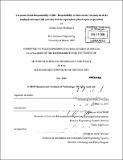| dc.contributor.advisor | Yossi Sheffi. | en_US |
| dc.contributor.author | Rodriguez, Adrian Xavier | en_US |
| dc.contributor.other | Massachusetts Institute of Technology. Technology and Policy Program. | en_US |
| dc.date.accessioned | 2010-10-29T18:39:02Z | |
| dc.date.available | 2010-10-29T18:39:02Z | |
| dc.date.copyright | 2010 | en_US |
| dc.date.issued | 2010 | en_US |
| dc.identifier.uri | http://hdl.handle.net/1721.1/59783 | |
| dc.description | Thesis (S.M. in Technology and Policy)--Massachusetts Institute of Technology, Engineering Systems Division, 2010. | en_US |
| dc.description | Page 88 blank. Cataloged from PDF version of thesis. | en_US |
| dc.description | Includes bibliographical references (p. 83-87). | en_US |
| dc.description.abstract | This thesis uses case study and interview data to present a framework for analyzing corporate behavior in order to define corporate social responsibility (CSR). It answers the question: Can corporations tie corporate social responsibility to the profit-making mission, and, if so, how? We define CSR as the actions that exceed the expectations placed upon the corporation. We demonstrate that the level of expectations, separating social irresponsibility from responsibility, is dynamic-changing over time and by region. This level is influenced by the maximum of three forces: social norms, market forces, regulatory standards. Actions that exceed expectations, what we consider CSR, are then categorized here in three broad groups: 1) Philanthropic: projects dealing with social good that have little or no relation to the corporate mission. 2) Strategic: initiatives that align and advance social and business goals simultaneously. 3) Social: actions typically addressed by social entrepreneurship designed and executed predominantly to target a social need. Finally, we validate the CSR framework and introduce areas of value-creation to be considered by corporations when making the decision to perform CSR. While CSR can be profitable and yield value, many things must be considered prior to engaging in CSR. | en_US |
| dc.description.statementofresponsibility | by Adrian Xavier Rodriguez. | en_US |
| dc.format.extent | 88 p. | en_US |
| dc.language.iso | eng | en_US |
| dc.publisher | Massachusetts Institute of Technology | en_US |
| dc.rights | M.I.T. theses are protected by
copyright. They may be viewed from this source for any purpose, but
reproduction or distribution in any format is prohibited without written
permission. See provided URL for inquiries about permission. | en_US |
| dc.rights.uri | http://dspace.mit.edu/handle/1721.1/7582 | en_US |
| dc.subject | Engineering Systems Division. | en_US |
| dc.subject | Technology and Policy Program. | en_US |
| dc.title | Corporate social responsibility (CSR) : responsibility or Innovation? : an analysis of the feedback between CSR activities and the expectations placed upon corporations | en_US |
| dc.title.alternative | Analysis of the feedback between CSR activities and the expectations placed upon corporations | en_US |
| dc.type | Thesis | en_US |
| dc.description.degree | S.M.in Technology and Policy | en_US |
| dc.contributor.department | Massachusetts Institute of Technology. Engineering Systems Division | |
| dc.identifier.oclc | 671247177 | en_US |
